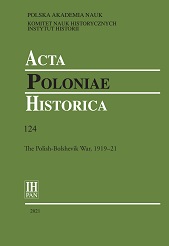Why During the Polish-Bolshevik War Did Soviet Propaganda Discourse Dominate European Public Opinion?
Why During the Polish-Bolshevik War Did Soviet Propaganda Discourse Dominate European Public Opinion?
Author(s): Aleksandra Julia LeinwandSubject(s): Military history, Political history, Pre-WW I & WW I (1900 -1919), Interwar Period (1920 - 1939), History of Communism
Published by: Instytut Historii im. Tadeusza Manteuffla Polskiej Akademii Nauk
Keywords: Poland; Bolshevik Russia; Great Britain; Polish-Soviet War 1919-20; propaganda; Western public opinion;
Summary/Abstract: In 1919–20, a war took place between two states that had emerged at the end of the Great War: Soviet Russia and the reborn Republic of Poland. It was a clash of widely different legal, political, and ideological systems. The conflict took place not only on the military and diplomatic planes but also within propaganda. Upon taking power in Russia, the Bolsheviks, in their official speeches, presented themselves to the world as the defenders of peace and the sovereignty of all nations; the imperial aspirations of Soviet Russia were hidden under the slogans of a world revolution that would liberate oppressed peoples. The military and ideological conquest began with a concentrated focus on neighbouring countries, including Poland. At the same time, a suggestive propaganda message was sent to the West, setting out the course of events from Moscow’s point of view.
Journal: Acta Poloniae Historica
- Issue Year: 2021
- Issue No: 124
- Page Range: 35-70
- Page Count: 36
- Language: English

